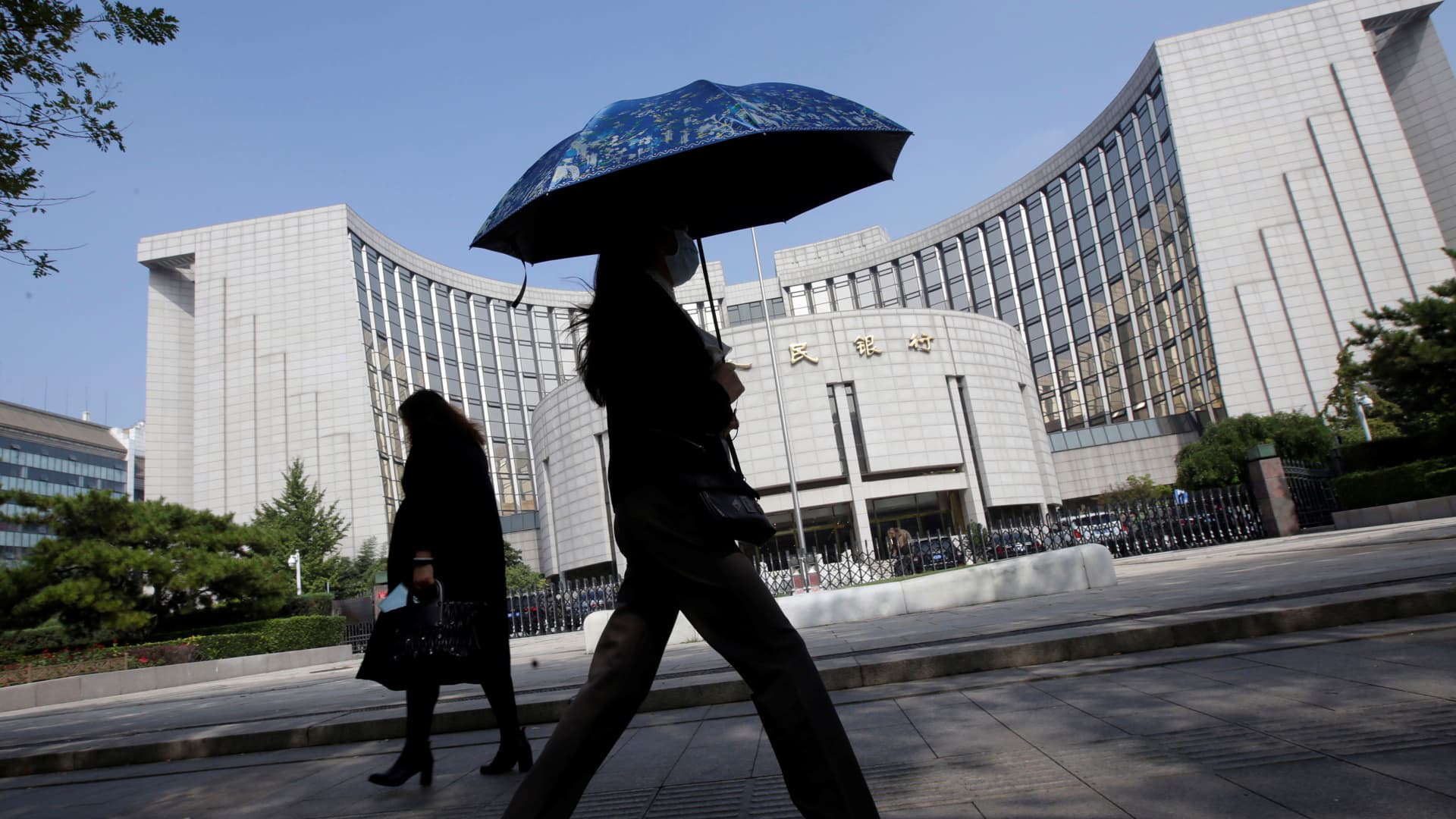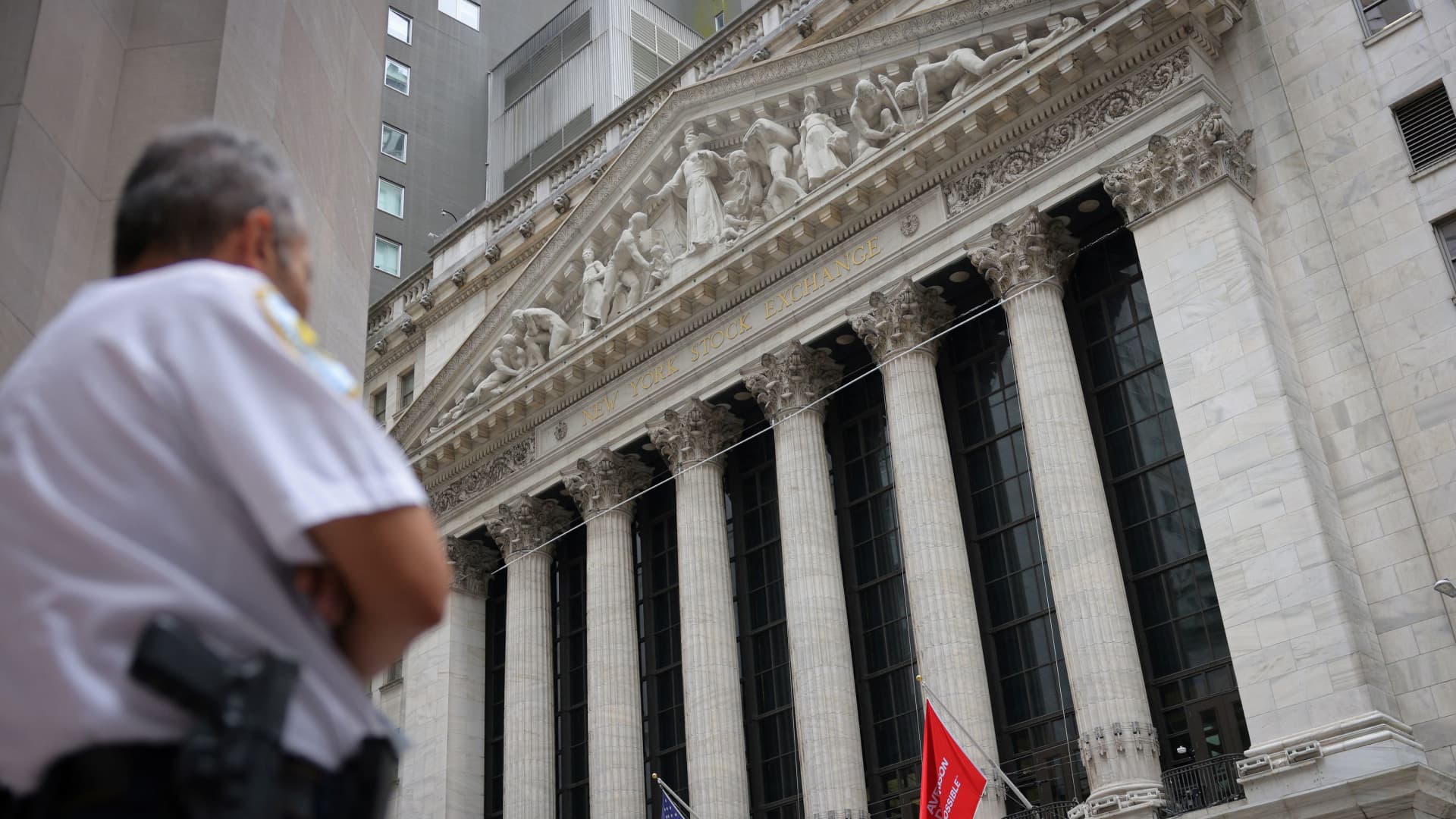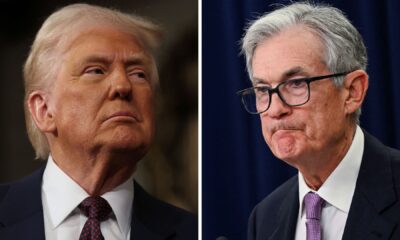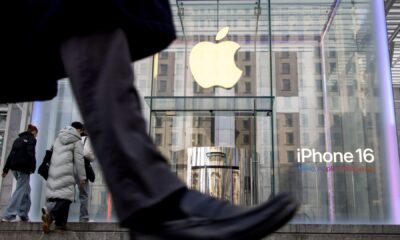Finance
China’s bond market intervention reveals financial stability worries
Published
9 months agoon

People walk past the headquarters of the People’s Bank of China (PBOC), the central bank, in Beijing, China September 28, 2018.
Jason Lee | Reuters
BEIJING — China’s latest efforts to stem a bond market rally reveals wider worries among authorities about financial stability, analysts said.
Slow economic growth and tight capital controls have concentrated domestic funds in China’s government bond market, one of the largest in the world. Bloomberg reported Monday, citing sources, that regulators told commercial banks in Jiangxi province not to settle their purchases of government bonds.
Futures showed prices for the 10-year Chinese government bond tumbled to their lowest in nearly a month on Monday, before recovering modestly, according to Wind Information data. Prices move inversely to yields.
“The sovereign bond market is the backbone of the financial sector, even if you run a bank-driven sector like China [or] Europe,” said Alicia Garcia-Herrero, chief economist for Asia-Pacific at Natixis.
She pointed out that in contrast to electronic trading of the bonds by retail investors or asset managers in Europe, banks and insurers tend to hold the government bonds, which implies nominal losses if prices fluctuate significantly.

The 10-year Chinese government bond yield has abruptly turned higher in recent days, after falling all year to a record low in early August, according to Wind Information data going back to 2010.
At around 2.2%, the Chinese 10-year yield remains far lower than the U.S. 10-year Treasury yield of nearly 4% or higher. The gap reflects how the U.S. Federal Reserve has kept interest rates high, while the People’s Bank of China has been lowering rates in the face of tepid domestic demand.
“The problem is not what it shows [about a weak economy],” Garcia-Herrero said, but “what it means for financial stability.”
“They have [Silicon Valley Bank] in mind, so what that means, corrections in sovereign bond yields having a big impact on your sovereign balance sheet,” she continued, adding that “the potential problem is worse than SVB and that’s why they’re very worried.”
Silicon Valley Bank collapsed in March 2023 in one of the largest U.S. bank failures in recent times. The company’s struggles were largely blamed on shifts in capital allocation due to aggressive rate hikes by the Fed.
PBoC Governor Pan Gongsheng said in a speech in June that central banks need to learn from the Silicon Valley Bank incident, to “promptly correct and block the accumulation of financial market risks.” He called for special attention to the “maturity rate mismatch and interest rate risk of some non-bank entities holding a large number of medium and long-term bonds.” That’s according to a CNBC’s translation of his Chinese.
Zerlina Zeng, head of Asia credit strategy, CreditSights, noted that the PBoC has increased intervention in the government bond market, from increased regulatory scrutiny of bond market trading to guidance for state-owned banks to sell Chinese government bonds.
The PBoC has sought to “maintain a steep yield curve and manage risks arising from the concentrated holding of long-end CGB bonds by city and rural commercial banks and non-bank financial institutions,” she said in a statement.
“We do not think that the intention of the PBOC’s bond market intervention was to engineer higher interest rates, but to guide banks and non-bank financials institutions to extend credit to the real economy rather than parking funds in bond investments,” Zeng said.
Insurance hole in the ‘trillions’
Stability has long been important for Chinese regulators. Even if yields are expected to move lower, the speed of price increases pose concerns.
That’s especially an issue for Chinese insurance companies that have parked much of their assets in the bond market — after guaranteeing fixed return rates for life insurance and other products, said Edmund Goh, head of China fixed income at Abrdn.
That contrasts with how in other countries, insurance companies can sell products whose returns can change depending on market conditions and extra investment, he said.
“With the rapid decline in bond yields, that would affect the capital adequacy of insurance companies. It’s a huge part of the financial system,” Goh added, estimating it could require “trillions” of yuan to cover. One trillion yuan is about $140 billion USD.
“If bond yields move lower slower it will really give some breathing space to the insurance industry.”
Why the bond market?
Insurance companies and institutional investors have piled into China’s bond market partly due to a lack of investment options in the country. The real estate market has slumped, while the stock market has struggled to recover from multi-year lows.
Those factors make the PBoC’s bond market intervention far more consequential than Beijing’s other interventions, including in foreign exchange, said Natixis’ Garcia-Herrero. “It’s very dangerous what they’re doing, because losses could be massive.”
“Basically I just worry that it will get out of control,” she said. “This is happening because there [are] no other investment alternatives. Gold or sovereign bonds, that’s it. A country the size of China, with only these two options, there’s no way you can avoid a bubble. The solution isn’t there unless you open the capital account.”
The PBoC did not immediately respond to a request for comment.
China has pursued an economic model dominated by the state, with gradual efforts to introduce more market forces over the last few decades. This state-led model has steered many investors in the past to believe Beijing will step in to stem losses, no matter what.
The news of a local bank canceling a bond settlement “came as a shock to most people” and “shows the desperation on the Chinese government side,” said abrdn’s Goh.
But Goh said he didn’t think it was enough to affect foreign investor confidence. He had expected the PBoC to intervene in the bond market in some form.
Beijing’s yield woes
Beijing has publicly expressed concerns over the speed of bond buying, which has rapidly lowered yields.
In July, the PBoC-affiliated “Financial News” criticized the rush to buy Chinese government bonds as “shorting” the economy. The outlet later diluted the headline to say such actions were a “disturbance,” according to CNBC’s translation of the Chinese outlet.
Chang Le, fixed-income senior strategist at ChinaAMC, pointed out that the Chinese 10-year yield has typically fluctuated in a 20 basis-point range around the medium-term lending facility, one of the PBoC’s benchmark interest rates. But this year the yield hit 30 basis points below the MLF, he said, indicating the accumulation of interest rate risk.
The potential for gains has driven up demand for the bonds, after such buying already outpaced supply earlier this year, he said. The PBoC has repeatedly warned of risks while trying to maintain financial stability by tackling the lack of bond supply.
Low yields, however, also reflect expectations of slower growth.
“I think poor credit growth is one of the reasons why bond yields have moved lower,” Goh said. If smaller banks “could find good quality borrowers, I’m sure they would rather lend money to them.”
Loan data released late Tuesday showed that new yuan loans categorized under “total social financing” fell in July for the first time since 2005.
“The latest volatility in China’s domestic bond market underscores the need for reforms that channel market forces toward efficient credit allocation,” said Charles Chang, managing director at S&P Global Ratings.
“Measures that enhance market diversity and discipline may help reinforce the PBOC’s periodic actions,” Chang added. “Reforms in the corporate bond market, in particular, could facilitate Beijing’s pursuit of more efficient economic growth that incurs less debt over the long term.”
You may like
Finance
These are 3 big things we’re watching in the stock market this week
Published
1 hour agoon
April 27, 2025
A security guard works outside the New York Stock Exchange (NYSE) before the Federal Reserve announcement in New York City, U.S., September 18, 2024.
Andrew Kelly | Reuters
The stock market bounce last week showed once again just how dependent Wall Street has become on the whims of the White House.

U.S. brands are rapidly losing their appeal in China as locals increasingly prefer competitive homegrown players, especially as economic growth slows, according to a TD Cowen survey released Thursday. While overall preference for Western brands dropped to 9%, down from 14% last year, certain American companies face higher risks than others, the report said, citing in-person interviews of 2,000 consumers with varied income levels in larger Chinese cities. TD Cowen partnered with an unnamed Beijing-based advisory firm to conduct the survey in February 2025, following a similar study in May 2024. The analysts see Apple ranking among the better-positioned brands in China. But they warned that several other American companies face high regional risks despite management optimism. China’s top leaders on Friday acknowledged the growing effect of trade tensions, and pledged targeted measures for struggling businesses. The official readout stopped short of a full-on stimulus announcement. “This year’s survey was conducted before the US-China trade war intensified, though threats were on the horizon,” the TD Cowen analysts said. “Add this factor to the equation, and it’s easy to see why uncertainty will remain elevated and households are likely to remain cautious going forward.” The survey found income expectations declined, with the share of respondents expecting a decline in pay over the next 12 months rising to 10% from 6%. In particular, Chinese consumers plan to spend less on a beauty items over the next six months, the survey showed, while increasing their preference for Chinese brands. U.S. cosmetics giant Estée Lauder retained first place in terms of highest awareness among Western beauty brands in China, but preference among consumers dropped to 19.6% of respondents, down from 24.3% last year. That contrasted with increases in respondents expressing a preference for the second and third market players Lancome and Chanel, respectively. In the quarter that ended Dec. 31, Estée Lauder said its Asia Pacific net sales fell 11%, due partly to “subdued consumer sentiment in mainland China, Korea and Hong Kong.” Asia Pacific accounted for 32% of overall sales in the quarter. In the lucrative sportswear category, Nike “lost meaningful preference in every category” versus last year, while local competitors Li-Ning and Anta saw gains, the survey found. TD Cowen’s analysis showed that among U.S. sportswear brands facing the most earnings risk relative to consensus expectations, Nike has the highest China sales exposure at 15%. “The China market is one characterized as a growth opportunity for sport according to Nike management in its recent fiscal Q3:25 earnings call in March 2025,” the analysts said, “but that the macro offers an increasingly challenging operating environment.” It’s not necessarily about slower growth or nationalism. While the survey found a 4-percentage-point drop in preference for foreign apparel and footwear brands, it also showed a 3-percentage-point increase in the inclination to buy the “best” product regardless of origin. “The implied perception here is that Western brands are offering less in the way of best product or value,” the TD Cowen analysts said. Starbucks similarly is running into fierce local competition while trying to maintain prices one-third or more above that of competitor Luckin Coffee, the report said. The survey found that the U.S. coffee giant “lags peers in terms of value and quality perception improvement.” Other coffee brands such as Manner, Tim’s, Cotti, %Arabica and M Stand have also expanded recently in China. Starbucks’ same-store sales in China fell 6% year on year in the quarter that ended Dec. 29, bringing the region’s share of total revenue to just under 8%. More worrisome is that a highly anticipated coffee boom in China may not materialize. “We note daily and weekly frequency of purchase among coffee drinkers are decreasing, suggesting the coffee habit seen in the U.S. is not taking hold in China,” the analysts said. They noted a new ownership structure for Starbucks‘ China business would be positive for the stock given the lack of near-term catalysts. TD Cowen rates Starbucks a buy, but has hold ratings on Nike and Estée Lauder.
Finance
Apple iPhone assembly in India won’t cushion China tariffs: Moffett
Published
1 day agoon
April 26, 2025

Leading analyst Craig Moffett suggests any plans to move U.S. iPhone assembly to India is unrealistic.
Moffett, ranked as a top analyst multiple times by Institutional Investor, sent a memo to clients on Friday after the Financial Times reported Apple was aiming to shift production toward India from China by the end of next year.
He’s questioning how a move could bring down costs tied to tariffs because the iPhone components would still be made in China.
“You have a tremendous menu of problems created by tariffs, and moving to India doesn’t solve all the problems. Now granted, it helps to some degree,” the MoffettNathanson partner and senior managing director told CNBC’s “Fast Money” on Friday. “I would question how that’s going to work.”
Moffett contends it’s not so easy to diversify to India — telling clients Apple’s supply chain would still be anchored in China and would likely face resistance.
“The bottom line is a global trade war is a two-front battle, impacting costs and sales. Moving assembly to India might (and we emphasize might) help with the former. The latter may ultimately be the bigger issue,” he wrote to clients.
Moffett cut his Apple price target on Monday to $141 from $184 a share. It implies a 33% drop from Friday’s close. The price target is also the Street low, according to FactSet.
“I don’t think of myself as the biggest Apple bear,” he said. “I think quite highly of Apple. My concern about Apple has been the valuation more than the company.”
Moffett has had a “sell” rating on Apple since Jan. 7. Since then, the company’s shares are down about 14%.
“None of this is because Apple is a bad company. They still have a great balance sheet [and] a great consumer franchise,” he said. “It’s just the reality of there are no good answers when you are a product company, and your products are going to be significantly tariffed, and you’re heading into a market that is likely to have at least some deceleration in consumer demand because of the macro economy.”
Moffett notes Apple also isn’t getting help from its carriers to cushion the blow of tariffs.
“You also have the demand destruction that’s created by potentially higher prices. Remember, you had AT&T, Verizon and T. Mobile all this week come out and say we’re not going to underwrite the additional cost of tariff [on] handsets,” he added. “The consumer is going to have to pay for that. So, you’re going to have some demand destruction that’s going to show up in even longer holding periods and slower upgrade rates — all of which probably trims estimates next year’s consensus.”
According to Moffett, the backlash against Apple in China over U.S. tariffs will also hurt iPhone sales.
“It’s a very real problem,” Moffett said. “Volumes are really going to the Huaweis and the Vivos and the local competitors in China rather than to Apple.”
Apple stock is coming off a winning week — up more than 6%. It comes ahead of the iPhone maker’s quarterly earnings report due next Thursday after the market close.
To get more personalized investment strategies, join us for our next “Fast Money” Live event on Thursday, June 5, at the Nasdaq in Times Square.

These are 3 big things we’re watching in the stock market this week

As Real ID deadline approaches, there are ‘workarounds,’ experts say

These U.S. consumer stocks face higher China risks

New 2023 K-1 instructions stir the CAMT pot for partnerships and corporations

The Essential Practice of Bank and Credit Card Statement Reconciliation

Are American progressives making themselves sad?
Trending
-

 Personal Finance1 week ago
Personal Finance1 week agoIRS’ free tax filing program is at risk amid Trump scrutiny
-

 Economics1 week ago
Economics1 week agoTrump’s approval rating on economy at lowest of presidential career
-

 Blog Post1 week ago
Blog Post1 week agoDocumenting Bookkeeping Processes and Procedures
-

 Economics1 week ago
Economics1 week ago‘He should bring them down’
-

 Economics7 days ago
Economics7 days agoDonald Trump wants a certain kind of immigrant: the uber-rich
-

 Economics7 days ago
Economics7 days agoTrump tariffs could cause summer economic slump: Chicago Fed president
-

 Economics1 week ago
Economics1 week agoChecks and Balance newsletter: The Democrats’ future is up for grabs
-

 Personal Finance5 days ago
Personal Finance5 days agoConsumers are making different financial choices in response to tariffs
